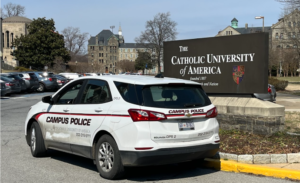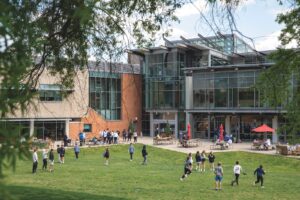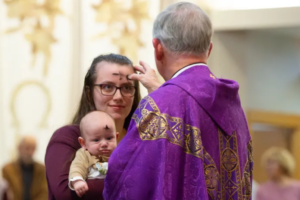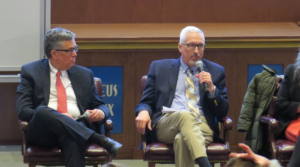Student Town Hall Announces Updates for Fall 2020 Semester
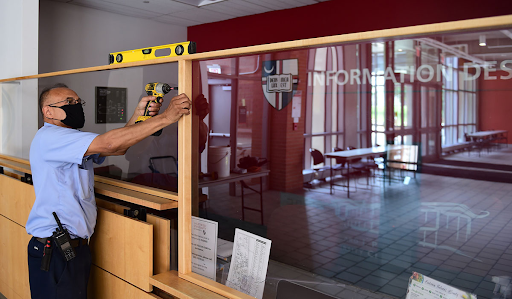
Image Courtesy of The Catholic University of America
By Anna Harvey
This past Wednesday evening, over 300 students, parents, and faculty members met for a virtual town hall meeting over Zoom, during which they learned of upcoming changes and requirements for the 2020 fall semester. Faculty members took turns explaining how various facets and departments of the university as well as student opportunities would function over the fall semester. After these presentations concluded, faculty members each answered questions submitted by students from surveys sent out prior to the town hall and other questions from the live chatbox. Below is a brief summary of each of the topics covered during the town hall.
COVID-19 Restrictions and Requirements:
Catholic University currently follows COVID-19 regulations as instructed by the District of Columbia and the Center for Disease Control and Prevention. As such, D.C.’s reopening will be in four separate phases. Phase one allows gatherings of no more than 10 individuals in one space. Phase two allows gatherings of no more than 50 individuals in one space. Phase three allows no more than 250 individuals in one space. Lastly, Phase four allows unlimited individuals in a single space, but a vaccine must be readily available prior to this phase.
Catholic University likewise adheres to D.C. laws requiring all individuals to wear a face mask in public areas, which also includes residential halls. The university also has ordered cardinal face masks for each student. Over the summer, Catholic University staff will install “sneeze guards” and signage reminding students of social distancing to help prevent the spread of the virus in these public buildings. Catholic University currently notifies students and their families of COVID-19 updates by means of a task force, which sends weekly emails detailing University changes or regulations.
Catholic University currently plans to begin its academic year on August 24, a week prior to when classes would have originally started. Students will leave the university for Thanksgiving break the week of November 25 and will resume classes online for the remainder of the semester. Finals will likewise take place online.
All students are required to take a COVID-19 PCR test within seven days prior to arrival on campus. This test may be either a nasal swab or a saliva test. Students who have previously contracted the virus must upload paperwork to the university’s Health Portal. Students traveling from abroad must self-isolate for fourteen days. PCR testing for nasal swabs or saliva tests will also be available on campus for target testing, which involves testing individuals who would be close to students that have the virus. The university is also looking into an app for faculty and staff to mark any symptoms or conditions that would indicate contraction of the virus.
Housing and Move-In for Residential Students:
Due to the close proximity of students within residential housing, some rooming accommodations will be changed. Students who live in residential buildings that have a hall-style bathroom will be given single rooms. Students in Centennial Village who have semi-suite style housing, on the other hand, may have a roommate. Apartments and suites in Opus Hall and Millenium Halls will be considered “family units” and consequently will keep their current arrangements. Contrary to the 2020 spring semester, room and board will not be prorated this coming fall semester. Returning students who received a credit for this past spring semester have had that credit applied to their upcoming housing bill and will see the credit on the bill when it arrives in their student accounts.
Move-in for new and returning students will take a departure from previous academic years. Phase-in for students may start as early as August 8 for early arrivals. New students that will participate in orientation will likely be scheduled for the Wednesday, Tuesday, and possibly the Monday right before Orientation on August 20. Local students who live within a day’s travel of the university will likely arrive the Friday and Saturday before classes start. A schedule for staggered student move-in on campus is in development, depending on student travel accommodations and traveling distance. All scheduling of student move-in, however, is dependent upon the phase in which D.C. is at that time.
Visitation policies likewise will change. While parents and siblings may help students move in and out, it is currently unclear as to whether they may visit their student’s dorm during the fall semester. Additionally, all visitors who are not Catholic University students are barred from visiting the dorms. University faculty is currently deliberating on whether to allow students to visit other students in different dorms.
Dining
After the Pryzbyla Center reopens on July 6, dining services will no longer be self-serve. Instead, students may tell servers at each station their preferred food options, and servers will give them their order in to-go containers. “Grab & go” pre-made meals will be available as well. Sneeze guards and other glass barriers will be implemented in the dining facilities, and all seating will be removed. Seating will instead be placed strategically around the Pryz and outdoors. Outdoor tents will be used as well for dining and other events.
Student meal plans begin the Saturday before classes start, but executive director Bill Jonas assures all students who arrive prior to August 22 that food will be readily available. Additionally, if students must be quarantined for any reason in their dorms, dining will bring meals and fresh produce to those dorms. This strategy has been used in past epidemics when students were obligated to quarantine.
Campus Ministry
All Campus Ministry events and administrations of the sacraments must comply with both D.C. regulations and guidelines of the Archdiocese of Washington. Multiple daily and Sunday masses will be offered in Caldwell, Maloney, and St. Vincent’s chapels. The university is currently determining whether Welcome Mass during orientation and mass before classes start may be held outside, due to the large volume of participants. The Archdiocese requires all students to wear a face-covering during mass. Ministry chaplain Fr. Jude D’Angelo emphasized the necessity and importance of this decision.
“Wearing a face covering or not wearing one in church is not a political statement and has nothing to do with your rights to decide what you will wear or will not wear. It is purely and simply a safety issue,” Fr. Jude said.
Visits to the Blessed Sacrament in Adoration will be held in Maloney and Caldwell chapels. The adoration chapels in St. Vincent and Opus, however, are not large enough to accommodate individuals while maintaining social distancing guidelines.
Campus Ministry currently is unsure as to whether service site visits, the Mother Teresa Day of Service, and campus retreats will operate as usual, since these events are dependent upon the phase in which D.C. is at the beginning of the academic year.
Academics
The university plans to move forward with in-person instruction. All of these classes, however, will be updated to be either hybrid courses or “blended” classes, in which some students will participate in class, and other students will participate online. Technology such as new cameras, microphones, document readers, and screens will be installed in classrooms to accommodate these new learning strategies. Classroom capacities may be changed depending on the number of students in each class.
For classes such as labs, which require physical manipulation of materials, students may follow a process where they are divided into teams, in which one member participates in an in-person lab and their partner observes online. Students in these teams will rotate, so as to gain a proper lab experience.
Freshman students who participate in Learning Communities (LC) will have both of their fall classes in-person.
As associate professor Dr. Lynn Mayer explained, “We have decided to prioritize those classes as in-person learning experiences, because we want our freshmen to have these opportunities on campus in class.”
Both of these classes will also be held virtually in the case that students would be unable to attend due to quarantine. In order to maximize social distancing, both of the LC classes will be held back-to-back in the same classroom.
In the case that students would be unable to attend classes for the first two weeks of the academic year due to travel accommodations or quarantine measures, they may be able to participate virtually. Attendance policies will be amended this semester to allow for these particular situations, as well as for scenarios in which students or their suitemates must be quarantined. Office hours will also be available during the upcoming semester but will likely be held online.
Additionally, Mullen Library will reopen for the fall semester with continued curbside pickup and digitization materials. To accommodate social distancing measures, Mullen’s hours and its seating capacity may be reduced.
The library has not determined a maximum occupancy number, however, and as Mayer notes, “The library in a lot of ways is the heart of the university on the academic side, and we are very happy to say that Mullen Library will be open during the fall semester.”
Campus Activities
Orientation for freshmen students will now take place on Thursday, August 20. Orientation for students will primarily be in-person, but the parent component of the orientation will now take place online. Some portions of the student orientation will take place online, particularly those which will help the new students acclimate to these new hybrid and “blended” classes. Additionally, all new students will be enrolled in an online seven-week program, starting on June 28, which will post videos for the students to review every week. Part of this program also involves students getting to know their Orientation Advisors and meeting in small groups depending upon their schedule.
For returning students, the Office of Student Activities will work with student organizations to help them create safe events both in-person and online. At the beginning of the semester, leaders of student organizations will be trained on how to continue hosting their weekly meetings and create events while accommodating social distancing guidelines. Currently, the university is planning to continue off-campus activities, depending upon which phase D.C. is in at the time.
Additionally, the Office of Student Activities created a task force to create wellness tools for student organizations to use to create enjoyable and safe events. The task force intentionally has two students to form subcommittees, which will focus on programming and marketing events.
The university will continue to employ students on-campus, although the number of available positions may be fewer than in previous semesters. Students who would like to apply for these opportunities can go to Handshake during the week of August 3rd.
Athletics
According to NCAA guidelines, student-athletes may return to campus by August 10. The university is still finalizing the return dates for student-athletes and may even allow some to return as early as August 8. Additionally, the NCAA has several phases that the Athletics department must follow. Only after the third phase is it possible for the athletics department to allow contact sports again.
Additionally, due to this phased approach, Director of Athletics Sean Sullivan observes, “Because of the delayed return that phasing back in requires, Landmark and Newmac conference games and Mac schedules are being reconfigured by the lead office in order accommodate.”
Fitness centers will also undergo several major changes. The Kane Fitness Center will be open but with changes necessary to whichever phase D.C. is in at the time, and fitness appointments may be necessary. Similarly, the DuFour Center will be open for team sports, but with modifications for use of equipment and added signage for social distancing.
Club sports may need to follow recommendations of leagues and governing bodies, and it is currently unknown whether competitions will take place this coming fall semester. Practice dates for varsity sports may begin at various points during the beginning of the semester to accommodate the NCAA’s phased approach. The Athletics department has made an athletics action team made of campus and local officials to consider NCAA recommendations and determine a phased return to all athletic operations in a plan titled “This is our Return to Play Playbook.”
Currently, D.C. officials have yet to approve Catholic University’s new policies for the upcoming semester. After the policies have been approved, they will be uploaded to the university’s website for students and their parents to review.

